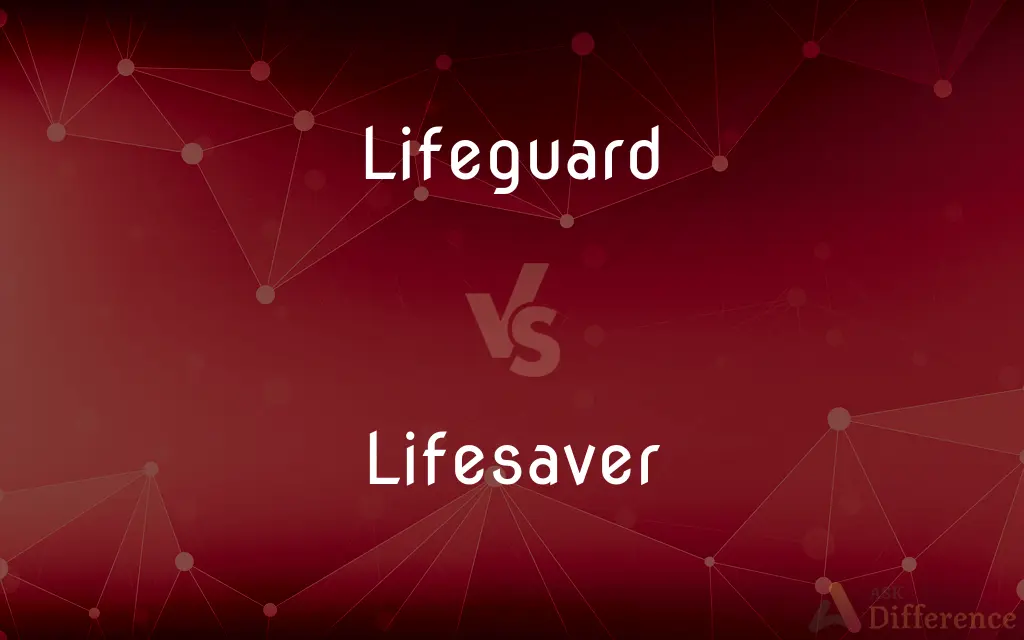Lifeguard vs. Lifesaver — What's the Difference?
By Urooj Arif & Fiza Rafique — Updated on April 5, 2024
A lifeguard is trained professional responsible for ensuring safety of swimmers at pools or beaches, focusing on emergency response. A lifesaver also involved in saving lives, refers more broadly to anyone or anything that prevents loss of life.

Difference Between Lifeguard and Lifesaver
Table of Contents
ADVERTISEMENT
Key Differences
While the role of a lifeguard is confined to aquatic settings and involves direct supervision and rescue efforts, a lifesaver can be anyone or anything that contributes to saving lives in a wide array of situations. Lifeguards are a subset of lifesavers, specialized in aquatic safety and emergency response.
Lifeguards play a proactive role in preventing accidents through enforcement of rules, educating swimmers on safety, and monitoring for signs of distress. Conversely, a lifesaver’s role can be reactive, intervening in life-threatening situations in various environments, not just aquatic ones.
The distinction also extends to training and certification. Lifeguards undergo rigorous and specific training to prepare for their roles, including physical fitness requirements and learning rescue techniques. On the other hand, lifesavers, in the broader sense, may have diverse backgrounds and training, depending on their professions or the situations they encounter.
Both lifeguards and lifesavers are crucial in their respective capacities for ensuring safety and preventing accidents. However, the term "lifeguard" denotes a specific profession with defined responsibilities and training, while "lifesaver" is a more general term that can apply to individuals, professions, or safety devices.
Comparison Chart
Definition
A trained professional focused on aquatic safety.
Anyone or anything that saves lives.
ADVERTISEMENT
Training
Specific to water rescue, first aid, CPR.
Varies widely depending on context.
Setting
Aquatic environments like pools and beaches.
Any environment where life-threatening situations occur.
Role
Preventative and reactive safety measures, rescue efforts.
Broadly includes preventing and responding to emergencies.
Examples
Monitoring swimmers, rescuing distressed individuals.
Performing CPR, using a defibrillator, emergency surgery.
Compare with Definitions
Lifeguard
A certified individual ensuring swimmer safety.
The lifeguard quickly responded to the swimmer in distress.
Lifesaver
Encompasses a broad range of life-saving actions.
Installing smoke detectors in homes is a lifesaving measure.
Lifeguard
Trained in aquatic rescue techniques.
Lifeguards practice water rescue drills regularly.
Lifesaver
Anyone who saves a life.
The passerby who performed CPR was a lifesaver.
Lifeguard
Responsible for enforcing safety rules.
The lifeguard reminded everyone not to run near the pool.
Lifesaver
Includes professionals in healthcare, emergency services.
Doctors and firefighters are often lifesavers.
Lifeguard
Provides first aid and emergency care.
Lifeguards are trained to perform CPR and use an AED.
Lifesaver
Can refer to life-saving devices or technology.
Seat belts are considered lifesavers in car accidents.
Lifeguard
Employed at pools, beaches, to monitor swimmers.
He worked as a lifeguard every summer at the local pool.
Lifesaver
Not limited to professional rescuers.
A quick-thinking teacher can be a lifesaver during a school emergency.
Lifeguard
A lifeguard is a rescuer who supervises the safety and rescue of swimmers, surfers, and other water sports participants such as in a swimming pool, water park, beach, spa, river and lake. Lifeguards are trained in swimming and CPR/AED first aid, certified in water rescue using a variety of aids and equipment depending on requirements of their particular venue.
Lifesaver
One that saves a life.
Lifeguard
An expert swimmer trained and employed to watch over other swimmers, as at a beach or swimming pool. Also called lifesaver.
Lifesaver
See lifeguard.
Lifeguard
To work or serve as a lifeguard.
Lifesaver
One that provides help in a crisis or emergency.
Lifeguard
(uncommon) A bodyguard or unit of bodyguards, a guard of someone's (especially a king's) life or person.
Lifesaver
A life preserver shaped like a ring.
Lifeguard
An attendant, usually an expert swimmer, employed to save swimmers in trouble or near drowning at a body of water.
Lifesaver
Someone or something that saves lives.
My dad loves his job as a surf lifesaver.
Paramedics are not just ordinary workers, but lifesavers with a very important job.
Lifeguard
A lifesaver. en
Lifesaver
(figuratively) Someone or something that is very useful or helpful.
Thank you so much for fixing my car; you're a real lifesaver!
This shop is a lifesaver on a hot day when you're craving a cold drink.
Lifeguard
(rail transport) A sturdy metal bracket fixed in front of each of the leading wheels of a train to deflect small objects away from the wheels to prevent derailment.
Lifesaver
An attendant employed at a beach or pool to protect swimmers from accidents
Lifeguard
An attendant employed at a beach or pool to protect swimmers from accidents
Lifesaver
A life preserver in the form of a ring of buoyant material
Common Curiosities
What is the main role of a lifeguard?
The main role of a lifeguard is to ensure the safety of swimmers by monitoring aquatic environments, preventing accidents, and providing rescue and first aid as needed.
What kind of training do lifeguards undergo?
Lifeguards undergo training in water rescue techniques, CPR, first aid, and the use of lifesaving equipment, along with maintaining physical fitness.
Can a device be a lifesaver?
Yes, devices like smoke detectors, life jackets, and defibrillators are considered lifesavers because they can prevent loss of life in emergencies.
What is the importance of lifesaving devices in everyday life?
Lifesaving devices are crucial in everyday life as they provide immediate assistance or protection during emergencies, significantly increasing the chances of survival.
Can anyone be considered a lifesaver?
Yes, anyone who takes action to save a life, whether through professional skills or spontaneous heroism, can be considered a lifesaver.
Are all lifeguards considered lifesavers?
Yes, all lifeguards are considered lifesavers in their capacity to prevent drownings and respond to emergencies in aquatic settings.
Is formal training required to be a lifesaver?
Formal training is not always required to be a lifesaver, as individuals can perform life-saving actions without specific training. However, professionals like lifeguards, doctors, and firefighters undergo extensive training for their roles.
What's the difference between a lifeguard's and a doctor's role as lifesavers?
A lifeguard's role is focused on preventing and responding to aquatic emergencies, while a doctor's role encompasses a wide range of medical interventions in various settings.
Can lifesaving techniques be learned by the general public?
Yes, lifesaving techniques like CPR and basic first aid can be learned by the general public through courses offered by various organizations.
How do lifesavers contribute to public safety?
Lifesavers contribute to public safety by preventing accidents and emergencies, providing emergency care, and educating the public on safety practices.
Share Your Discovery

Previous Comparison
Burrow vs. Den
Next Comparison
Concomitant vs. ConcurrentAuthor Spotlight
Written by
Urooj ArifUrooj is a skilled content writer at Ask Difference, known for her exceptional ability to simplify complex topics into engaging and informative content. With a passion for research and a flair for clear, concise writing, she consistently delivers articles that resonate with our diverse audience.
Co-written by
Fiza RafiqueFiza Rafique is a skilled content writer at AskDifference.com, where she meticulously refines and enhances written pieces. Drawing from her vast editorial expertise, Fiza ensures clarity, accuracy, and precision in every article. Passionate about language, she continually seeks to elevate the quality of content for readers worldwide.













































